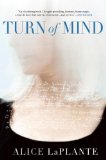Summary | Excerpt | Reading Guide | Discuss | Reviews | Beyond the Book | Readalikes | Genres & Themes | Author Bio

The shame.
This half state. Life in the shadows. As the neurofibrillary tangles proliferate,
as the neuritic plaques harden, as synapses cease to fire and my
mind rots out, I remain aware. An unanesthetized patient.
Every death of every cell pricks me where I am most tender. And people
I don't know patronize me. They hug me. They attempt to hold my
hand. They call me prepubescent nicknames: Jen. Jenny. I bitterly accept
the fact that I am famous, beloved even, among strangers. A celebrity!
A legend in my own mind.
My notebook lately has been full of warnings. Mark very angry today.
He hung up on me. Magdalena says do not speak to anyone who calls. Do not
answer the door when she's doing laundry or in the bathroom.
Then, in a different handwriting, Mom, you are not safe with Mark. Give
the medical power of attorney to me, Fiona. It is best to have medical and
financial powers of attorney in the same hands anyway. Some things are
crossed out, no, obliterated, with a thick black pen. By whom?
My notebook again:
Mark called, says my money will not save me. I must listen to him. That
there are other actions we must take to protect me.
Then: Mom, I sold $50,000 worth of IBM stock for the lawyer's retainer. She
comes highly recommended for cases where mental competency is an issue. They
have no evidence, only theories. Dr. Tsien has put you on 150 mg of Seroquel
to curb the episodes. I will come again tomorrow, Saturday. Your daughter, Fiona.
I belong to an Alzheimer's support group. People come and they go.
This morning Magdalena says it is an okay day, we can try to attend.
The group meets in a Methodist church on Clark, squat and gray with
clapboard walls and garish primary-colored stained-glass windows.
We gather in the Fellowship Lounge, a large room with windows that
don't open and speckled linoleum floors bearing the scuff marks of the
metal folding chairs. A motley crew, perhaps half a dozen of us, our minds
in varying states of undress. Magdalena waits outside the door of the
room with the other caregivers. They line up on benches in the dark
hallway, knitting and speaking softly among themselves, but attentive, prepared
to leap up and take their charges away at the first hint of trouble.
Our leader is a young man with a social-worker degree. He has a kind
and ineffectual face, and likes to start with introductions and a joke.
My-name-is-I-forgot-and-I-am-an-I-don't-know-what. He refers to what
we do as the Two Circular Steps. Step One is admitting you have a problem.
Step Two is forgetting you have the problem.
It gets a laugh every time, from some because they remember the joke
from the last meeting, but from most because it's new to them, no matter
how many times they've heard it.
Today is a good day for me. I remember it. I would even add a third
step: Step Three is remembering that you forget. Step Three is the hardest
of all.
Today we discuss attitude. This is what the leader calls it. You've all received
this extraordinarily distressing diagnosis, he says. You are all intelligent,
educated people. You know you are running out of time. What
you do with it is up to you. Be positive! Having Alzheimer's can be like
going to a party where you don't happen to know anyone. Think of it!
Every meal can be the best meal of your life! Every movie the most enthralling
you've ever seen! Have a sense of humor, he says. You are a visitor
from another planet, and you are observing the local customs.
But what about the rest of us, for whom the walls are closing in? Whom
change has always terrified? At thirteen I stopped eating for a week
because my mother bought new sheets for my bed. For us, life is now
terribly dangerous. Hazards lie around every corner. So you nod to all
the strangers who force themselves upon you. You laugh when others
laugh, look serious when they do. When people ask do you remember
you nod some more. Or frown at first, then let your face light up in
recognition.
Excerpted from Turn of Mind by Alice LaPlante. Copyright © 2011 by Alice LaPlante. Excerpted by permission of Atlantic Monthly Press. All rights reserved. No part of this excerpt may be reproduced or reprinted without permission in writing from the publisher.
What really knocks me out is a book that, when you're all done reading, you wish the author that wrote it was a ...
Click Here to find out who said this, as well as discovering other famous literary quotes!
Your guide toexceptional books
BookBrowse seeks out and recommends the best in contemporary fiction and nonfiction—books that not only engage and entertain but also deepen our understanding of ourselves and the world around us.